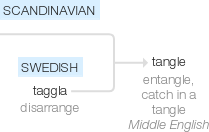Tangle
Middle English (in the sense ‘entangle, catch in a tangle’): probably of Scandinavian origin and related to Swedish dialect taggla ‘disarrange’.
wiktionary
From Middle English tanglen, probably of North Germanic origin, compare Swedish taggla(“to disorder”), Old Norse þǫngull, þang(“tangle; seaweed”), see Etymology 2 below.
Of North Germanic origin, such as Danish tang or Swedish tång, from Old Norse þongull, þang. See also Norwegian tongul, Faroese tongul, Icelandic þöngull.
etymonline
tangle (v.)
mid-14c., nasalized variant of tagilen "to involve in a difficult situation, entangle," from a Scandinavian source (compare dialectal Swedish taggla "to disorder," Old Norse þongull "seaweed"), from Proto-Germanic *thangul- (source also of Frisian tung, Dutch tang, German Tang "seaweed"); thus the original sense of the root evidently was "seaweed" as something that entangles (itself, or oars, or fishes, or nets). "The development of such a verb from a noun of limited use like tangle 1 is somewhat remarkable, and needs confirmation" [Century Dictionary]. In reference to material things, from c. 1500. Meaning "to fight with" is American English, first recorded 1928. Related: Tangled; tangling. Tanglefoot (1859) was Western American English slang for "strong whiskey."
tangle (n.)
1610s, "a tangled condition, a snarl of threads," from tangle (v.).
